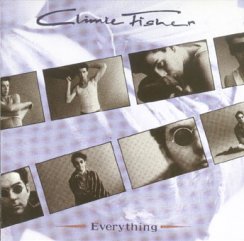Graham Reid | | 6 min read

The rock music thing used to be quite
straightforward. A few people got together, practiced a few covers,
wrote some original material and the band honed its act in pubs and
clubs and on the road.
Somewhere down the line a record
company appeared and the band made records.
These days that process can be
reversed.
Noel Crombie of Schnell Fenster talks
of journalists being flown from Britain to Melbourne to see the band
- who have already recorded their debut album -- when they appear
live for the first time.
And recently the two members of Blue
Mercedes buzzed through Auckland to promote their debut album and
perform a couple of songs at a nightclub - with backing tapes.
Then this week, another Brit-pop male
duo, Climie Fisher, stopped off in the city briefly as part of an
almost continuous round of album promotion which has taken them to
the States, Europe, Japan, Australia and Hong Kong.
And with a brace of intelligent pop
singles from their Everything album charting around the world, the
promo push is to continue for some time yet.
It's a necessary evil, acknowledge
Simon Climie and Rob Fisher - who have yet to perform live as Climie
Fisher - as they concede they are another band in the male pop duo
style.
"Yes, there are a lot about,"
says Fisher, "but we make the analogy that machines make it
easier to create a whole sound. The Beatles and Stones would have
been duos because the main force came out of two people and the rest
were backing musicians.
"The difference is nowadays record
companies don‘t tend to sign backing musicians.”
“The duo thing began about l980."
says Climie, “when synthesizers and drum machines were readily
available. Once you can create the whole sound exactly to your liking
it’s very difficult to go back to the band situation because you
lose so much control."
Fisher says they are keen to get out
and play live -- if for no other reason than the press would give
them a hard time if they didn't, he jokes -- and it’s something
they are familiar with and enjoy doing In fact, Climie Fisher are
something different from run-of-the-mill studio popsters or record
company-created artists as the finely honed pop of their singles Love
Changes Everything, Rise to the Occasion and I Won't Bleed for You
all show.
Fisher was a member of the band Naked
Eyes who had a couple of top 10 singles in the States before he
returned to Britain to do session work with Billy Ocean, the
Communards and the Cult. He also worked with Peter Gabriel.
Climie has written songs which have
been recorded by Roger Daltrey, Leo Sayer and Jeff Beck, and worked
with Scritti Politti. His song I Knew You Were Waiting went to number
one worldwide for George Michael and Aretha Franklin.
That collective experience has been
translated into the singles-packed album which owes its strengths to
Climie's distinctive vocals, an ear for a good hook in a song and
months of labouring over their own l6-track home studio.
"There are frustrations working in
the background of sessions on many projects," says Climie. "You
know you could improve melodies, so we've been quite desperate to get
our own mark on things.
“Our music is a fusion of styles and
I love all that late Beatles and Motown stuff plus the best of
everything since. But you’ve got to notice all that from an
observational point of view.”
He cites a recent Brit-pop male duo who
"think they’re brilliant because they've got 16-year-olds
screaming at them" and says in the end it all comes down to the
strength of the songs.
Working with Scritti Politti, a band
who occupy the same highly crafted lightly funky area as they do, was
“informative and, publicity-wise, very valuable,” says Clime.
"But Scritti Politti can be a bit
of a muso's band. Green [Gartside of Scritti Politti] is more
paranoid than us and he'd tell you that as well.
“He reached a certain point and was
paranoid he couldn't get any better -- and he did. Now he's even more
paranoid. But their stuff is a little one-dimensional because they’re
too scared to have genuine input from other people. We welcome it.“
Although Everything credits few
musicians outside of Climie and Fisher those who do get a name check
have had considerable input. A key figure is Nashville songwriter
Dennis Morgan who co-wrote five of the 10 tracts and who has had
"something like 200 songs covered in the country field but
wanted to get out of that," according to Climie.
The song Rise to the Occasion also
features the vocal backing of the black-British trio View from a Hill
who add a breathy soulful backdrop.
"They are contemporaries of ours
who signed to EMI at the same time," says Fisher. "They are
a soft soul band.”
"We adored their song No
Conversation,” says Climie, "so when we did Rise we thought
we'd get them in to get the some mood into it. They popped over to
our studio and did it and it worked out so well we used that one for
the record."
The album also boasts production by
Steve Lillywhite on one side and Steven Hague on the other. A
skeleton-thin dance remix of the ballad Rise came courtesy of Phil
Harding of the PWL Studios.
“We wanted a good dance version as it
was going to be the next single in England because it's very
difficult to get a ballad away so we got Phil to do a remix for
clubs." says Fisher.
“When we first heard it we thought he
was mental -- or a genius. After we heard the basics it look us a
couple of minutes to adjust, but on the radio it is compressed and
doesn't sound as empty as it does on tape."
But although Climie Fisher have reasons
to be cheerful about the success of their singles and can point to a
diverse poppy album which doesn't insult the intelligence, the promo
circuit they have to undertake is preventing them from going out live
or getting back into the studio.
But their name will still be out there.
Australian singer Kate Ceberano has
recorded one of their song, Even the Mighty Fall, and so have Five
Star.
But as different singles keep happening
for them they have to catch the next flight and off.
They may not have come up the old way
of touring and recording, but they’ve got there. And there's always
a place for good radio pop.
Ask Rod Stewart.
When they wrote Love Changes Everything
they had him in mind. He turned it down.
He's kicking himself now apparently.
Two years on from this interview Climie Fisher broke up after a second, but less successful album. Simon Climie went into production work and co-writing with Eric Clapton, Rob Fisher also got into production and worked with Clapton. They were on his least impressive albums of the Eighties.
Rob Fisher died of complications after an operation in '99. He was 42.







post a comment